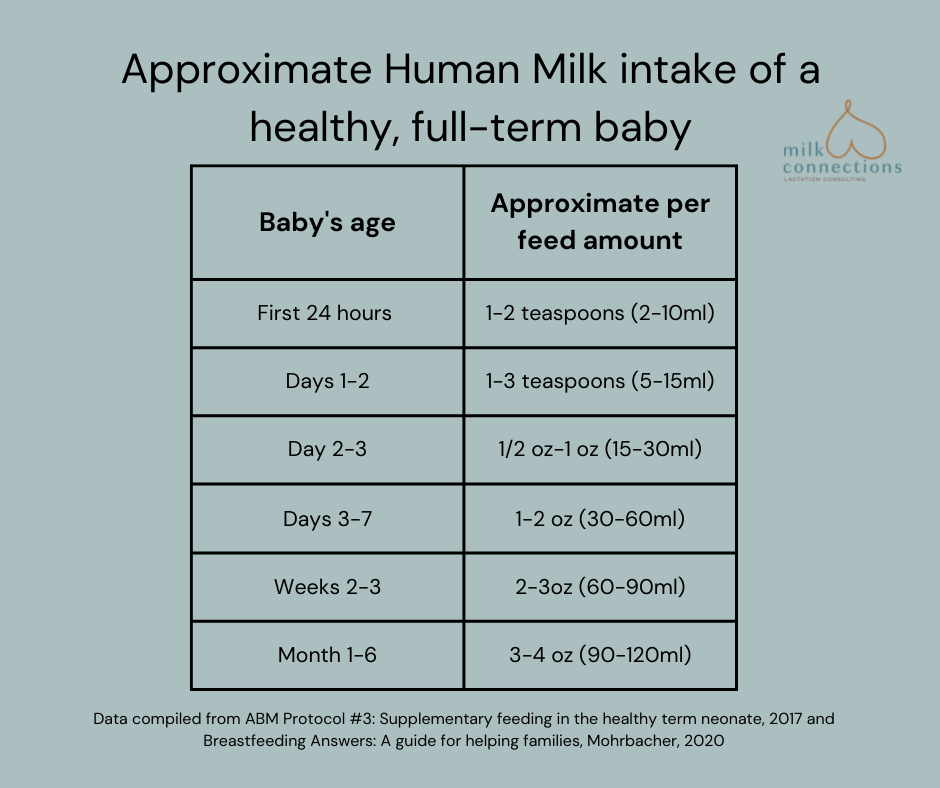It can be hard in the early days to figure out how much milk you need to make for your baby. You might be thinking that your baby is always hungry and nurses all the time. You might be unsure if this is normal and expected. For a healthy, full-term baby, frequent breastfeeding and chestfeeding every 1-3 hours is normal in the first few days-to-weeks after birth.
What are normal amounts of milk to produce?
It can be reassuring to know that in the first 24-48 hours after birth, your baby only takes in 1-3 teaspoons per nursing session! Your milk production gradually grows to about 3-4 oz (90-120ml) per feed over the first month after birth based on your baby’s demand and stays at about this level for the first six months of life (Figure 1). You might be asking, ‘How does my body know how to make more milk?”. Your milk production is controlled by the ‘demand’ of your baby and the resulting ‘supply’ at your breast/chest. That is, the more frequently you nurse your baby (about 8-12 or more times per day), the more milk your body will make. Our bodies are amazing! It is normal to nurse all the time, every 1-3 hours, around the clock, especially in the beginning.

If I’m directly nursing, how do I know my baby is getting enough?
As mentioned before, it is normal for babies to nurse all the time in the beginning to help increase your milk production. There are several signs that your baby will give you that they are full, satisfied, and getting enough milk. These are the things you should look for:
- My baby has at least 3-4 bowel movements and 6-7 or more pees in 24 hours after day 5 and until 6 weeks old (Figure 2). After about 4- 6 weeks old, some babies decrease output to once per day or less.
- At the end of a nursing session, my baby looks ‘milk drunk’. He falls off the breast and his hands are relaxed and open.
- I see or hear my baby swallowing milk. She will have large downward jaw movements and pause just before swallowing. She should have 1-2 sucks per swallow and actively feed for longer than a few minutes. If you are unsure if you baby is nursing effectively, these first three videos can help.
- She is waking on her own every two to three hours and showing hunger cues (rooting, lip smacking, and fist in mouth).
- He is visibly growing bigger, outgrowing his clothes, and reaching his developmental milestones.

What can I do if my baby is not nursing well?
If your baby is nursing all the time and you are worried that they are not getting enough milk, you should book an appointment with your midwife, pediatrician, and lactation consultant. Your lactation consultant can weigh your baby before and after a feed to see how much milk he is transferring. Together, you and your LC and other care providers can come up with a plan to address any low milk supply concerns. Reach out to us at Milk Connections Lactation Consulting. We are here to help support you with any infant feeding concerns!
References
ABM Clinical Protocol #3: Supplementary Feedings in the Healthy Term Breastfed Neonate, Revised 2017 2017, 12 (4):188 Breastfeeding Medicine
Mohrbacher, N. (2020). In Breastfeeding answers: A guide for helping families. essay, Nancy Mohrbacher Solutions, Inc.




